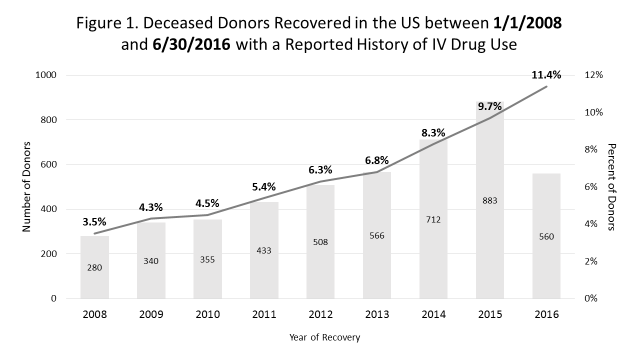Deceased Donors with a History of IV Drug Use and Donor Derived Hepatitis C Virus.
1OPTN Ad Hoc Disease Transmission Advisory Committee, Richmond, VA
2UNOS, Richmond
Meeting: 2017 American Transplant Congress
Abstract number: 160
Keywords: Donation, Hepatitis C, Infection
Session Information
Session Name: Concurrent Session: New Insights - HCV / HIV
Session Type: Concurrent Session
Date: Sunday, April 30, 2017
Session Time: 4:30pm-6:00pm
 Presentation Time: 4:42pm-4:54pm
Presentation Time: 4:42pm-4:54pm
Location: E271b
Introduction:In 2015, the CDC reported a 172% increase in heroin-related deaths from 2010 to 2013. Deceased donors with IV drug use (IVDU) are at increased risk for window period hepatitis C. We wished to determine if an increase in donor-derived hepatitis C has occurred.
Methods:OPTN data on DD recovered in the US during 1/1/08-6/30/16 were examined. Information on history of IVDU and increased risk status was obtained from data provided by OPOs in DonorNet. The Disease Transmission Advisory Committee (DTAC) receives report of possible donor infections and these were reviewed for reports including hepatitis C. The DTAC uses a standardized classification algorithm to determine if donor-derived disease was transmitted.
Results: Data from 2008 to first half of 2016 showed similar trend as CDC data. In 2008, 3.5% of donors recovered had a documented history of IV drug use. That has more than tripled, to 11.4% in the first six months of 2016. Between 1/1/08–6/30/16 the OPTN received 86 unexpected PDDTE of HCV. Proven and probable cases of donor-derived hepatitis have remained stable, with 1-3 positive donors reported yearly from 2008 to 2015 and one case in the first 6 months of 2016. 39% of IVDU donors have a positive hepatitis C test compared to 2% non-IVDU donors.
Conclusion: The opioid epidemic has resulted in marked increase in donors with a history of IVDU at risk for window period infection with hepatitis C. No corresponding increase in hepatitis C transmission has occurred. Increased use of NAT screening of donors might be partially responsible. The low number of reported transmissions can help inform discussions with potential recipients regarding the risk associated with donors with an IVDU history.
| Year | Proven/Probable hepatitis C | Not P/P | Total |
| 2008 | 1 | 7 | 8 |
| 2009 | 2 | 8 | 10 |
| 2010 | 1 | 6 | 7 |
| 2011 | 3 | 8 | 11 |
| 2012 | 1 | 10 | 11 |
| 2013 | 0 | 11 | 11 |
| 2014 | 2 | 12 | 14 |
| 2015 | 1 | 5 | 6 |
| 6/2016 | 1 | 4 | 8 (3 not reviwed) |
CITATION INFORMATION: Kaul D, Clark M, Michaels M, Tlusty S, Wolfe C. Deceased Donors with a History of IV Drug Use and Donor Derived Hepatitis C Virus. Am J Transplant. 2017;17 (suppl 3).
To cite this abstract in AMA style:
Kaul D, Clark M, Michaels M, Tlusty S, Wolfe C. Deceased Donors with a History of IV Drug Use and Donor Derived Hepatitis C Virus. [abstract]. Am J Transplant. 2017; 17 (suppl 3). https://atcmeetingabstracts.com/abstract/deceased-donors-with-a-history-of-iv-drug-use-and-donor-derived-hepatitis-c-virus/. Accessed February 18, 2026.« Back to 2017 American Transplant Congress
